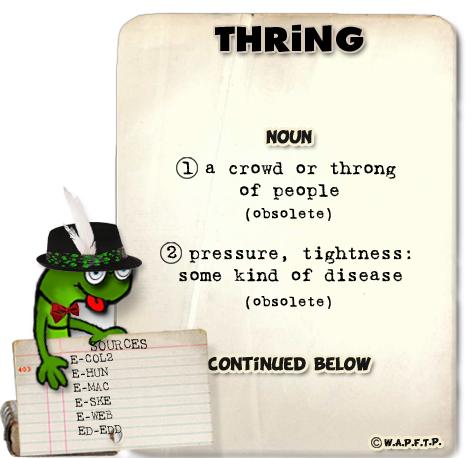|
DEFINITIONS CONTINUED
VERBS 1. to press, to crowd, to throng; to move or gather in a crowd; to assemble; to crowd around, to throng a person (obsolete) 2. to press or push forward, as against obstacles; to push or force one's way hastily or eagerly; to press, rush, hasten, push on (obsolete except dialect) 3. to press hard, use oppression; to oppress, to harass, to distress, to afflict (obsolete) 4. to press together, to squeeze, to compress; to crush, to bruise (obsolete) 5. to thrust or drive with pressure or violence; to cast, throw, or fling violently; to hurl, dash, knock (obsolete except dialect) 6. (with 'down') to throw down by force; to thrust or knock down; to overthrow; to bring to ruin 7. to thrust or crush (into a confined space); to shut up, to confine (obsolete) 8. to make way through something by pressure; to pierce, to penetrate; to burst out (obsolete) CLICK HERE FOR KEY TO SOURCES ETYMOLOGY noun: from Old English ᵹeþring neut. press, crowd, tumult, from þring-an to press, crowd verb: (from E-NED) Old English þringan, þrang (pl. þrungon), þrungen. Com. Teut. = OS. thringan (MLG., MDu., Du. dringen), OHG. dringan (MHG., Ger. dringen), ON. þryngva, - gja (pa. tense þrǫng, þrungom, pa. pple. þrungenn), cf. Goth. þreihan (pa. tense þráih, þraihum, pa. pple. þraihans):—OTeut. *þriŋh(w)-: þriŋg(w)-; cf.Lith. trènkti to shake, strike, trànksmas uproar, scrimmage, Lett. treekt to shatter The Gothic þreihan passed into a different conjugational class. EXAMPLE From: Letters of Samuel Rutherford Edited by the Rev. Andrew A. Bonar, 1891 Letter CCLXXXII. To the Lady Robertland.
0 Comments
Leave a Reply. |
Archives
September 2021
|

